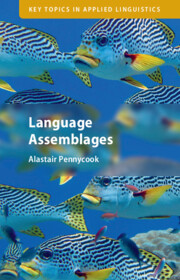Book contents
- Language Assemblages
- Key Topics in Applied Linguistics
- Language Assemblages
- Copyright page
- Contents
- Acknowledgements
- 1 Why Language Assemblages?
- 2 Language, Knowledge, Myths and Being
- 3 Structures and Practices
- 4 Linguistic, Semiotic and Sociomaterial Assemblages
- 5 Other Language Ontologies
- 6 Applied Linguistics as Practical Assemblage
- Suggested readings
- Glossary
- References
- Index
2 - Language, Knowledge, Myths and Being
Published online by Cambridge University Press: 20 June 2024
- Language Assemblages
- Key Topics in Applied Linguistics
- Language Assemblages
- Copyright page
- Contents
- Acknowledgements
- 1 Why Language Assemblages?
- 2 Language, Knowledge, Myths and Being
- 3 Structures and Practices
- 4 Linguistic, Semiotic and Sociomaterial Assemblages
- 5 Other Language Ontologies
- 6 Applied Linguistics as Practical Assemblage
- Suggested readings
- Glossary
- References
- Index
Summary
The historical relationship between linguistics and applied linguistics, one producing knowledge about language and the other applying it to real-world contexts, creates a hierarchy of linguistic knowledge, with linguistic knowledge at the top, everyday views on language at the bottom and applied linguistics somewhere in the middle, mediating between the two. This relationship has started to shift as applied linguists have sought to develop their own views of language based on their engagements with language users and contexts. A key framework for this book is a form of critical social realism that allows for more than one reality, grounds epistemologies in social relations and takes a critical-ethical position on choosing between different versions of the world. Central to this discussion are questions of ontology – what language is – and the ontological turn in the social sciences. Alongside ontological questions about what languages are, a related concern is whose version of language counts. Various ways of getting at this, from lay, folk and citizen linguistic perspectives, have emphasized this need to include knowledge of language from outside the disciplinary confines of linguistics. A practical theory of language surely needs a strong relationship with how language users think about language.
Keywords
Information
- Type
- Chapter
- Information
- Language Assemblages , pp. 20 - 49Publisher: Cambridge University PressPrint publication year: 2024
